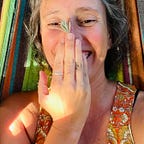The primal richness of places
- Why do we insist on only looking inward?
- Why do we think that our physical, emotional, and psychic well-being is only dependent on the interior of our homes?
- Why do we control and shape our inner environments according to rules imported from other places and cultures?
These questions serve to open us to a larger and more inclusive systemic reality, to make us aware and receptive once again of the integrity of the places that inhabit us.
As I often say, our bodies and our homes are always somewhere, a place that is not an abstract setting but a living, present, and authentic context — a place of the deep interconnection of life with itself.
Can we identify where the water that feeds our house comes from if we don’t know it? From which area, what is its route or treatment until it reaches our taps. Yes, the water taken for granted at every faucet — in privileged homes — the one that quenches our thirst, with which we wash and cook. Where does it come from?
Do we also know where the electricity that feeds all our extreme neo-technological needs comes from? What is its route and its actual cost in ecological terms? What about gas, whether bottled or piped? And what about the firewood to appease the cold winter nights?
I am just mentioning the constant energy needs that each house demands.
There is still no trace of the original building materials; where did they come from, how were they extracted, molded, or manufactured? How do they contrast with the original materials of the place? Do they speak the same language? Like, for example, when you build with wood from Northern Europe in southwest Europe, in a total dissonance between matter and place.
Despite these tours and exchanges, our home is in a particular place and not in another. It has the floor and foundation in a specific landscape and not in any other. The place we inhabit is not global and could not be anywhere else. It is here and has its own history, frequency, and system, most of the time already adulterated and molded by the excessive and irresponsible human presence.
Before the home comes the place, the sacred ground that has accompanied us since primordial times.
What if, instead of constantly complaining about what we lack, we started to listen?
What melodies are sung in our place?
What stories whisper to us?
How do we relate to this specific landscape that nourishes us all the time?
What riches are hidden at every step in the place where we live?
How can we take care of it?
If you like the article, please clap. Remember that you can clap up to 50 times if you like it a lot!
[Disclaimer: all these words and weaved concepts are birthed through my lived, biased, and always limited perception of things, not supposing to bring any absolute truth.]
By Sofia Batalha
Mammal, author, woman-mother, question weaver and dismantling global-colonial-technological-capitalism one day at a time. Awkward prose-poet with no grammatical knowledge. Pilgrim through inner and outer landscapes, remembering ancient earth practices, in radical presence, active listening, ecopsychology, art, ecstasy, and writing. Author of seven books, editor of the free online magazine, Wind and Water, Re-member the Bones Podcast, and Beyond the Sea Conversations — all in Portuguese.
More information: sofiabatalha.com
